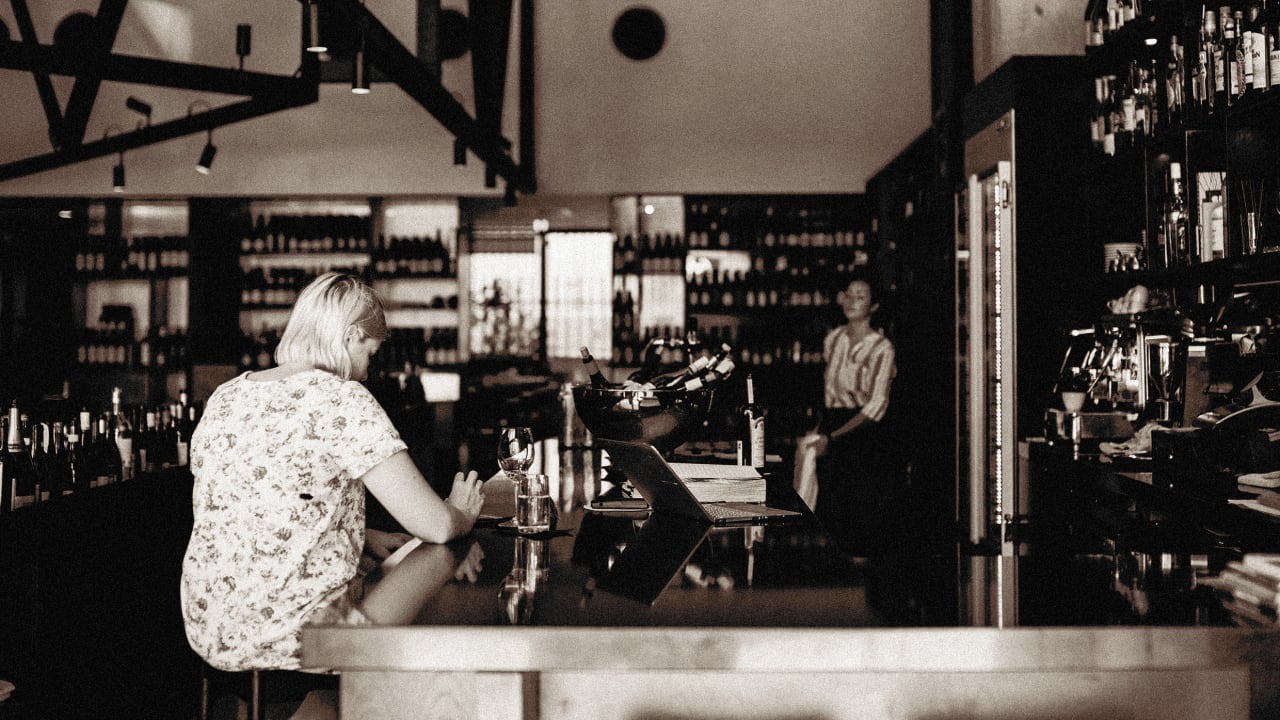How smartphones wrecked bar drinking
When the first wave of lockdown regulations ended, back in 2020, I can still remember what I was most excited for. Going to bars again. Perhaps, during a moment of such gravity, this excitement may seem trivial, or even louche. But I love bars, and always have. I love the opportunities (increasingly rare) that they present for just quietly sitting and thinking, for luxuriating in a small pleasure. I love the way they mark the end of the work-day or the work-week and the entry into leisure. I love the way that you can walk into a town as a stranger, and leave knowing a fair cross-section of its dynamics and characters simply by spending a few hours sitting at its bar. I love the space they open up to talk to strangers, or merely observe them. I love that you never know exactly what you’ll get. I was excited to go back to the bars again, but when I did, something felt different–something felt off. Everything felt a bit smaller, a bit faded. I don’t think anything had actually changed that much from a few months of closure. But I do think that my anticipatory excitement, coupled with a period of forced separation, made me notice something that before had slipped past my consciousness as, over a decade, it slowly became the new normal. It was the creeping spread of the lonely corner. The Lonely Corner As long as I can remember, a certain kind of un-fancy, middle-of-the-road bar has had what I call “the lonely corner.” Someone is always huddled over the glowing pay-to-play machines mounted on the bar, sometimes gambling, sometimes playing simple touchscreen games. They’ll order beer after beer, barely looking up as they while away one, two, five hours. I always thought these machines were predatory, luring the exhausted or emotionally dysregulated or unhappily solitary into one of the saddest possible ways to drink: alone in a crowd, without alcohol’s social boost, without much apparent joy in the drink, as part of a compulsive routine. But the lonely corner used to at least be a corner. Now, those same bars often host an eerie vision: a row of barstools filled with people downing their beers and hunched over their hands, scrolling their feeds, never taking an eye off their screens. The lonely corner is everywhere. Smartphones make bars worse places. In an ideal scenario they wouldn’t. In an ideal scenario the most disciplined smartphone user would be the model smartphone user. The little pocket computer would come out to answer a message, look up a piece of trivia to settle an argument, or take a picture, and then go back in the pocket. But in real life, what you largely get is the doomscroll. And the doomscroll destroys what is most wonderful about bars. The quiet moments of reflection, the silences and pauses that become opportunities to chat with your neighbor, the way the whole bar can become participants in the banter between a bartender and a patron–these are all casualties. Scrolling on your phone is an obvious defense against the awkwardness of sitting silent and alone in a place built for social encounter–you feel like you’re doing something, you look like you’re doing something. But in providing an easy out from those awkward moments, scrolling also removes the openings that allow awkwardness to blossom into conviviality. And each time you take the easy out, I have found, the psychic cost of sitting through the awkwardness or boredom becomes higher. Doomscrolling is the gateway to doomdrinking If smartphones diminish what is best about bars, they also enhance their worst possibilities. The doomscroll is a self-soothing mechanism that accelerates and distracts from the passage of time. Alcohol, in certain quiet, ugly moments, can be a much more potent and dangerous version of the same. There’s great pleasure in a mindless beer, staring off into space, content in the moment–but add the scroll and you’re likely to get a mutually reinforcing compulsive cycle. Drinking takes on the logic of the infinite feed: endless, mindless, appetite without the possibility of satiety. I don’t like the way I drink when I have my phone in my hand. These days, I pretty much only stop by the bar if I’ve left it at home. It’s not, by any stretch of the imagination, a convenient arrangement. And for a more disciplined person it’s probably an unnecessary one. But then again, a more disciplined person is probably already at home doing pilates. Drinking in bars is life’s gift to the undisciplined–unproductive, pointless, lounging fun–and I’m not about to let my smartphone take it away from me. I am not suggesting that all bars have always been, or must be, non-stop festivals of spontaneous joviality. People have always gone to sports bars to watch TV; plenty of people go to bars to read a book or a paper, catch up on mindless paperwork, jot things down in little notebooks. I’ve done all the above, and it’s very pleasant and cozy to do these solitary activities in the company of others and with a dr

When the first wave of lockdown regulations ended, back in 2020, I can still remember what I was most excited for. Going to bars again. Perhaps, during a moment of such gravity, this excitement may seem trivial, or even louche. But I love bars, and always have. I love the opportunities (increasingly rare) that they present for just quietly sitting and thinking, for luxuriating in a small pleasure. I love the way they mark the end of the work-day or the work-week and the entry into leisure. I love the way that you can walk into a town as a stranger, and leave knowing a fair cross-section of its dynamics and characters simply by spending a few hours sitting at its bar. I love the space they open up to talk to strangers, or merely observe them. I love that you never know exactly what you’ll get.
I was excited to go back to the bars again, but when I did, something felt different–something felt off. Everything felt a bit smaller, a bit faded. I don’t think anything had actually changed that much from a few months of closure. But I do think that my anticipatory excitement, coupled with a period of forced separation, made me notice something that before had slipped past my consciousness as, over a decade, it slowly became the new normal.
It was the creeping spread of the lonely corner.
The Lonely Corner
As long as I can remember, a certain kind of un-fancy, middle-of-the-road bar has had what I call “the lonely corner.” Someone is always huddled over the glowing pay-to-play machines mounted on the bar, sometimes gambling, sometimes playing simple touchscreen games. They’ll order beer after beer, barely looking up as they while away one, two, five hours.
I always thought these machines were predatory, luring the exhausted or emotionally dysregulated or unhappily solitary into one of the saddest possible ways to drink: alone in a crowd, without alcohol’s social boost, without much apparent joy in the drink, as part of a compulsive routine.
But the lonely corner used to at least be a corner. Now, those same bars often host an eerie vision: a row of barstools filled with people downing their beers and hunched over their hands, scrolling their feeds, never taking an eye off their screens. The lonely corner is everywhere.
Smartphones make bars worse places. In an ideal scenario they wouldn’t. In an ideal scenario the most disciplined smartphone user would be the model smartphone user. The little pocket computer would come out to answer a message, look up a piece of trivia to settle an argument, or take a picture, and then go back in the pocket. But in real life, what you largely get is the doomscroll. And the doomscroll destroys what is most wonderful about bars. The quiet moments of reflection, the silences and pauses that become opportunities to chat with your neighbor, the way the whole bar can become participants in the banter between a bartender and a patron–these are all casualties. Scrolling on your phone is an obvious defense against the awkwardness of sitting silent and alone in a place built for social encounter–you feel like you’re doing something, you look like you’re doing something. But in providing an easy out from those awkward moments, scrolling also removes the openings that allow awkwardness to blossom into conviviality. And each time you take the easy out, I have found, the psychic cost of sitting through the awkwardness or boredom becomes higher.
Doomscrolling is the gateway to doomdrinking
If smartphones diminish what is best about bars, they also enhance their worst possibilities. The doomscroll is a self-soothing mechanism that accelerates and distracts from the passage of time. Alcohol, in certain quiet, ugly moments, can be a much more potent and dangerous version of the same. There’s great pleasure in a mindless beer, staring off into space, content in the moment–but add the scroll and you’re likely to get a mutually reinforcing compulsive cycle. Drinking takes on the logic of the infinite feed: endless, mindless, appetite without the possibility of satiety. I don’t like the way I drink when I have my phone in my hand. These days, I pretty much only stop by the bar if I’ve left it at home. It’s not, by any stretch of the imagination, a convenient arrangement. And for a more disciplined person it’s probably an unnecessary one. But then again, a more disciplined person is probably already at home doing pilates. Drinking in bars is life’s gift to the undisciplined–unproductive, pointless, lounging fun–and I’m not about to let my smartphone take it away from me.
I am not suggesting that all bars have always been, or must be, non-stop festivals of spontaneous joviality. People have always gone to sports bars to watch TV; plenty of people go to bars to read a book or a paper, catch up on mindless paperwork, jot things down in little notebooks. I’ve done all the above, and it’s very pleasant and cozy to do these solitary activities in the company of others and with a drink in your hand. But there are important differences.
Watching sports is already a shared activity; people do it in bars to react with others, to share their pleasure and their pain. The others are discrete tasks, with natural bounds and breaks built in. They are different types of human activity that take place within their real physical context, visible to others and enriching the shared space as objects of conversation or curiosity. The scroll is different. It fills up any and all empty moments. It offers no obvious conversational ingress. Mentally, it takes you into the alternate virtual world of the screen and out of your physical context, and it creates no silent, enriching presence. To the outside world, whatever you are doing on a phone looks like the same thing: being on your phone.
Doing a crossword puzzle at a bar makes a solitary activity social. Smartphones at a bar make social experiences solitary.
Decades ago, we realized that some technologies were too powerful to be safely combined with the effects of alcohol. “Friends don’t let friends drink and drive” was painstakingly hammered from a mere slogan into a social norm. It may be time to consider a similar norm (though without, of course, the legal prohibition) for a technology whose dangers are chronic and diffuse rather than acute and concentrated. There is a growing awareness of the way smartphones can hinder serious pursuits: distracting children at school, reducing the capacity for sustained attention at work. But I think it is worth guarding our unserious pursuits, our inattention, our trivialities, from their depredations as well. Friends don’t let friends drink and scroll.






















